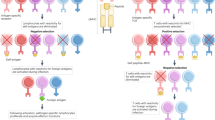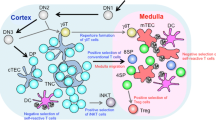Abstract
The thymus is central to the establishment of a functioning immune system. Here is the place where T cells mature from hematopoietic progenitors, driven by mutual interactions of stromal cells and the developing thymocytes. As a result, different types of T cells are generated, all of which have been carefully selected for the ability to act in host defense towards non-self and against the potential to mount pathogenic self-reactive autoimmune responses. In this review we summarize our present knowlege on the lineage decisions taking place during this development, the selection processes responsible for shaping the T cell antigen-receptor repertoire, the interactions with the stromal components and the signal transduction pathways which transform the interactions with the thymic microenvironment into cellular responses of survival, proliferation, differentiation and, importantly, also of cell death.
Similar content being viewed by others
Author information
Authors and Affiliations
Corresponding author
Additional information
Received 12 June 2003; received after revision 22 July 2003; accepted 28 July 2003
Rights and permissions
About this article
Cite this article
Bommhardt, U., Beyer, M., Hünig, T. et al. Molecular and cellular mechanisms of T Cell development. CMLS, Cell. Mol. Life Sci. 61, 263–280 (2004). https://doi.org/10.1007/s00018-003-3224-3
Issue Date:
DOI: https://doi.org/10.1007/s00018-003-3224-3




